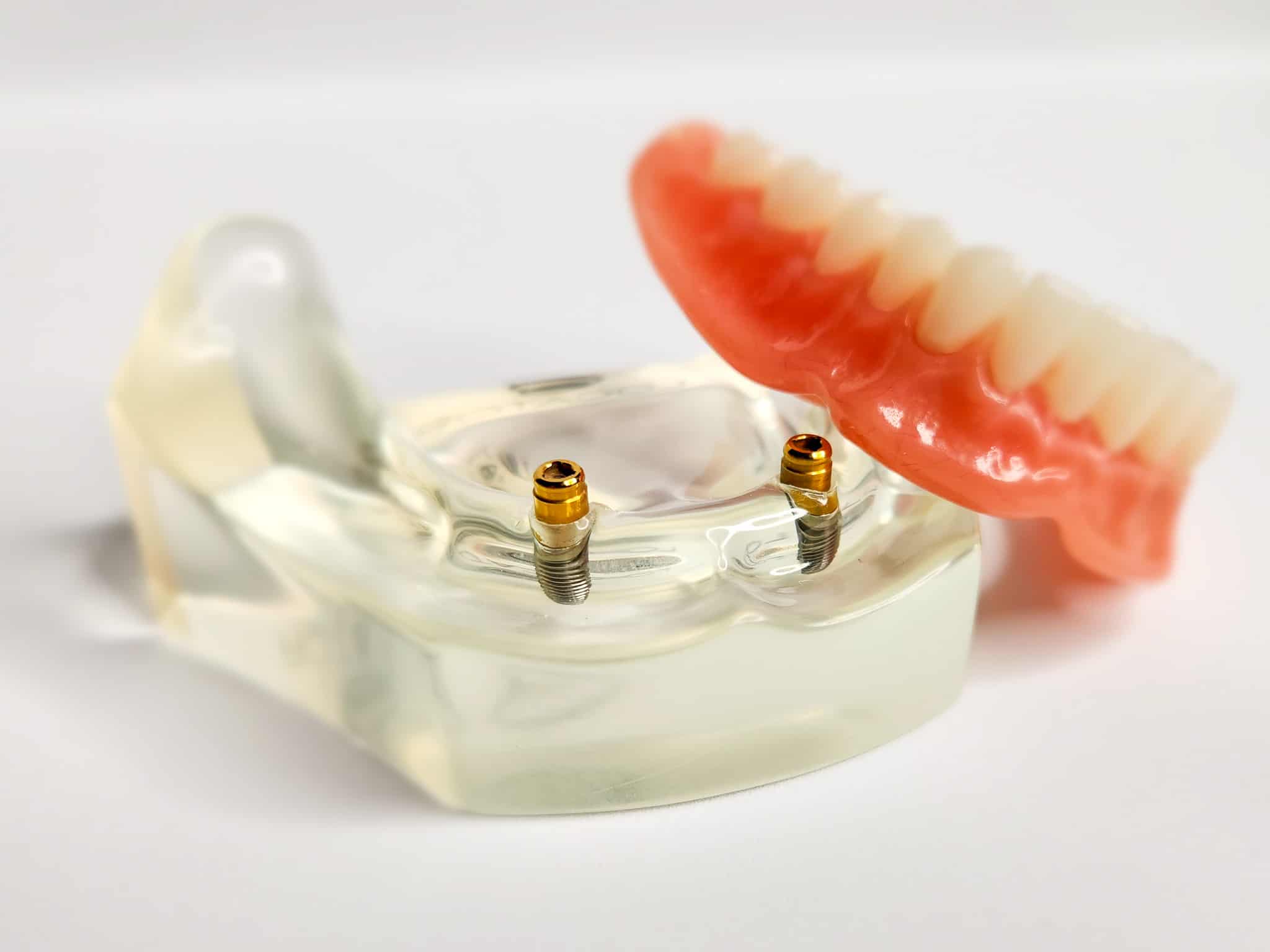Implant Dentures
Dentures are a great way to give you confidence and restore your smile. But unfortunately, even the best-made denture can have issues. These include difficulties eating certain foods due to loss of biting force. In addition, the lower denture can float while talking or eating, among other minor issues.
Denture adhesives and relines can temporarily fix these issues, but they are not a permanent solution. With an implant-supported denture, you can solve these issues permanently. In addition, you will also find many other significant advantages with an implant-supported denture.
If you’re ready to smile, laugh, and eat with confidence. Without worrying about a loose denture or using gross sticky adhesives, please schedule a free consultation and have our highly trained and licensed denturist find the right implant fit for you.

Advantages Of Implant Retained Dentures
- Eat, talk, and laugh without worries of your denture coming loose.
- A more secure and comfortable denture while eating, allowing you to eat a more well-rounded diet and improving your health.
- No movement in your denture, causing little to no irritation or sores.
- The ability to remove the palette on your upper denture, making your denture more comfortable and natural feeling.
- Implants will help slow down bone absorption and preserve your facial structure.
- You will no longer need messy, slimy, sticky denture adhesives.
- Implants can dramatically help increase biting force up to 85% compared to traditional dentures, making once hard-to-eat foods much easier.
Types Of Implants We Process & Service
Locator Abutments
locator abutments are the most common type of implants for dentures. These implants have a larger head. These implants consist of 2 or more on each arch. Inside the denture, there are colored sleeves that snap over these abutments and lock your denture into place. The colored sleeves inside the denture must be replaced every six months. The cost of sleeve replacement is $20.00 per attachment.
Mini or Ball Implants
Mini or ball implants are smaller implants that are usually placed four or more on each arch. The colored O-ring inside the denture snaps over the head or ball of the implant and locks the denture into place. The O-rings inside the denture must be replaced every six months. The cost of O-Ring replacements is $10.00 per attachment.
Hader Bar Attachments
Hader bar attachments are stabilized by a fixed metal bar attached to the bone and a plastic rider that clicks over the metal bar to secure the denture. The colored plastic rider inside the denture must be replaced every six months. The cost of rider replacement is $15.00 per attachment.
ERA Implants
ERA implants are usually placed in the existing root of a canine or bicuspid; the natural tooth is prepped, and the ERA implant is placed directly into the root of your natural tooth. The colored sleeve inside the denture then snaps over the ERA securing the denture into place. These implants are not as common as others. The colored nylon sleeve must be replaced every six months. The cost of colored sleeve replacement is $22.00 per attachment.
Common questions about implant-supported dentures
First, the implant is surgically placed into the jaw bone by a dentist or oral surgeon. Depending on your type of implant and treatment plan, the operating dentist or oral surgeon will want the implant to heal for 3-4 months in the bone. During this healing time, you can still wear your traditional denture. Once the implant has healed in the bone, the second part of the implant can be placed called the abutment, which can be a metal stud or bar that sits above the gum tissue and attaches to the denture. At this time, the denture can be fitted for the opposing attachments that snap over the stud or bar. This process can be lengthy, but it is well worth the wait; Implants will make wearing a denture a more enjoyable experience.
Implants should be treated just like your natural teeth. Implants and the surrounding tissue should be cleaned daily with a soft toothbrush, and for hard-to-reach places around the implant, you can use a Waterpik or an implant cleaning brush. Doing this daily will help prevent implant failure due to gum disease or infection. Your dentures should also be cleaned daily. Dentures should be taken out nightly and placed in a denture cup with water and a denture cleaning solution such as overnight Efferdent tablets. After soaking overnight in the denture cleaning solution, take your denture out of the denture bath. With a denture brush, scrub the inside of the denture and the tooth surface, removing any debris or buildup. Then rinse under clean water. Cleaning your implants and denture daily will ensure a long life and fewer complications with your denture or implants.
Yes, although implants help slow down bone resorption, it does not completely stop it. If you start noticing food getting underneath your implant denture or your denture is rocking when snapped over your implants, this could be a sign that the bone surrounding your implants has receded, causing these issues. This can be easily fixed by doing a reline. A reline will fill in any spaces between your gum and tissue due to bone loss and stop rocking or food from getting under your denture. A reline will need to be done every 2-3 years to maintain a proper fit and function of your denture and implants.
This can vary for every oral surgeon or dentist, we do not place implants into the jaw bone in our office, but we process and fix any implant parts needed on the denture. We can refer you to the best oral surgeons or dentists in the Treasure Valley who can help you decide the best implant options for you.
Taking your dentures out at night gives your mouth time to relax and decompress, but many patients that have implants prefer to sleep with them in because of the fear of the metal abutments causing sores or damage to their gums. If you feel more comfortable keeping them in at night, we suggest you soak your dentures for at least 20 minutes in a denture cleaning solution and brush them daily. We also highly recommend purchasing a night guard you can mold to your dentures to wear at night. This will help reduce unnecessary wear or damage to your denture while you sleep.
Absolutely, even the Highest-quality denture will eventually wear down, and if you have implants, this could be a little confusing on what to do when it’s time to replace your old denture. You may have moved to a new area, or your previous dentist or denturist has retired. At Premier Dentures, we can build you a new custom deluxe denture designed for your implants, no matter the type of implant you may have. In our advanced in-house lab, we can process and restore Locators, ERA’s, Mini or ball implants, hader bars, and many other types of implants.
These small pieces have different names depending on your implant type. These pieces are made of nylon or rubber and are known as sleeves, O-rings, riders, or inserts. These colored attachments snap around the implant attached to the jawbone and give your denture a tight, secure fit. Over time these colored attachments will wear down, and you will notice your denture doesn’t fit as tightly as it did when you first got your denture. These colored attachments should be replaced around every six months to maintain a proper and tight fit around your implants. These colored attachments can be easily replaced in our office and takes less than ten minutes to replace. The cost per attachment can vary due to implant type, but this cost is minimal. For prices, check types of implants we process and service.
The average lifetime for an implant is around 25 years or longer if properly taken care of but Just like our natural teeth, a dental implant can fail earlier due to poor oral hygiene or other genetic issues causing the implant to become loose or ultimately come out of the bone. It is extremely important that your implants are properly cleaned daily, along with yearly professional cleanings and check-ups, to ensure a long life for your implants.
This is a discussion that you will need to have with your oral surgeon or dentist to see if you are a good candidate for implants. They will need to check the bone and make sure that there is enough healthy bone to place the implant successfully. They will also go over any genetic issues or health problems that may lead to a failed implant. If you are wondering if you are a good candidate for implants and have questions, our office is more than happy to refer you to the best oral surgeons or dentists in the Treasure Valley to see if implants are a good fit for you.

